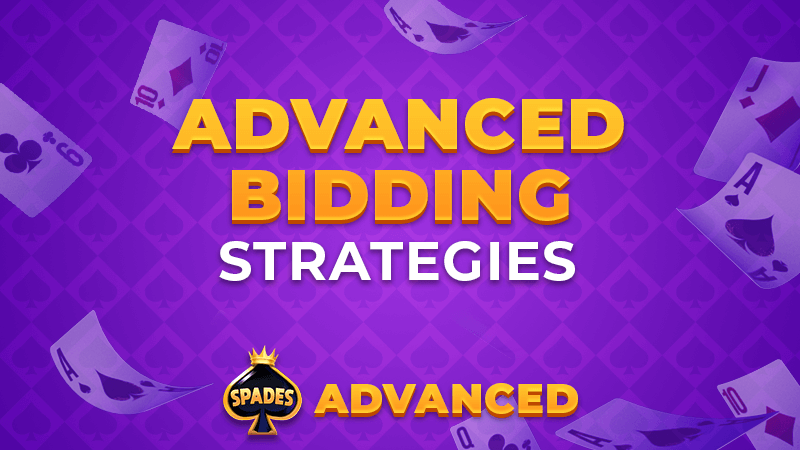Advanced Bidding Strategies in Spades

In this article, we’ll explore the most important advanced bidding strategies in Spades. You’ll learn how overbidding and underbidding can both be useful in certain situations, how bluffing during the bidding phase can mislead opponents, and how to approach the high-risk, high-reward Nil and Blind Nil bids.
1. Why Advanced Bidding Matters
At its core, Spades is a game of contracts: you and your partner must win the number of tricks you bid. The challenge comes from the fact that you’re not bidding in isolation – your opponents are trying to hit their contracts, too.
Advanced bidding lets you:
- Pressure opponents into mistakes.
- Conceal the true strength of your hand.
- Protect your partner or set opponents.
- Take advantage of scoring quirks like sandbags.
Good bidding sets the tone for the entire hand. Bad bidding can doom even the strongest hand.
2. Overbidding: Playing Aggressively
Overbidding means declaring more tricks than you realistically expect to win. On the surface, this might seem reckless. After all, if you miss your contract, you get set, and the penalty is severe. But advanced players sometimes use overbidding as a weapon.
One reason to overbid is to put pressure on your opponents. If you and your partner combine for a bid of ten tricks, you leave your opponents with only three to fulfill their contract. This forces them into difficult decisions and often into mistakes.
Overbidding can also be a way to avoid sandbags. If you think you’ll take more tricks than you want, bidding a little higher ensures those tricks count toward your contract rather than piling up as penalties.
The danger, of course, is that if your hand does not cooperate, you may find yourself short. But consider this example: you are holding Ace, Queen, and Ten of Spades, plus strong Hearts with the Ace and King. It looks like a solid five or six tricks. If your partner tends to play aggressively, you might stretch to seven. It’s risky, but if it pays off, you control the round and avoid building up unnecessary bags.
3. Underbidding: Playing Conservatively
At the opposite end of the spectrum is underbidding, which means declaring fewer tricks than you actually expect to win. Many new players underbid out of fear, but advanced players sometimes use it strategically.
One benefit of underbidding is that it conceals the true strength of your hand. If you have a powerhouse hand but bid low, opponents may overextend themselves, thinking you are weaker than you are. Underbidding can also be useful in managing the bag situation. If your team already has several sandbags, bidding low ensures you will not push yourself into an even larger penalty.
There are risks, however. Sandbags may look harmless, but once they add up to ten, your team loses one hundred points. That is not a small setback. Furthermore, habitual underbidding can frustrate your partner, who relies on accurate information to plan their play.
4. Bluffing in the Bidding Phase
Spades is not poker, but bluffing is still possible and, at times, very effective. Bluffing in bidding is about sending misleading signals to your opponents, not your partner. By making your hand seem stronger or weaker than it really is, you can influence how opponents bid and play.
How to Bluff in Bidding
- Bid high with a shaky hand: Sometimes you bid 5 with only 3 likely tricks, hoping opponents misread your confidence. This can push them into bidding too cautiously.
- Bid low with a strong hand: If you have a powerful hand but bid conservatively, opponents might get overconfident and overbid themselves.
- Coordinate with your partner: Bluffing works best when your partner understands your tendencies and can cover or adapt.
The key to bluffing is balance. If you bluff too often, your partner will stop trusting your bids, and that erodes the foundation of your teamwork. Bluffing works best when used sparingly, as a way to tilt the mental game in your favor.
5. The Nil Bid
The Nil bid is one of the most thrilling and dangerous parts of Spades. When you bid Nil, you are declaring that you will take no tricks for the entire round. If you succeed, you score one hundred points, which can swing the game dramatically in your favor. But if you fail and accidentally win even a single trick, you lose one hundred points.
Benefits of Nil
- Worth 100 points if successful, which can swing a game.
- Forces opponents to waste high cards trying to set you.
- Can be protected by a strong partner.
Risks of Nil
- If you accidentally take even one trick, you fail, costing you -100 points.
- Requires careful coordination with your partner.
When your partner knows you are Nil, their role is to protect you. They will use their high cards to cover tricks you might accidentally win. For this reason, trust and coordination between partners are crucial. Nil is not just about your own hand but about the combined ability of you and your partner to execute the strategy.
6. The Blind Nil Bid
The Blind Nil takes the risk and reward of Nil and magnifies it. In a Blind Nil, you bid Nil before even looking at your cards. If you succeed, your team earns 200 points. If you fail, you lose 200 points.
Blind Nil is not a bid to use lightly. Most teams only consider it when they are far behind and need a dramatic swing to get back into the game. Sometimes, a Blind Nil is less about strategy and more about desperation.
- Overbid when you want to pressure opponents or avoid bags.
- Underbid strategically to conceal strength or support Nil.
- Bluff sparingly to keep opponents guessing.
- Nil and Blind Nil are powerful tools, but they require careful planning and partnership trust.
The next time you sit down to play Spades, remember that your bid is more than just a number. It’s a signal, a weapon, and sometimes even a bluff. The more advanced your bidding strategy becomes, the more you will find yourself controlling the flow of the game – and that’s the difference between playing Spades and mastering it.

